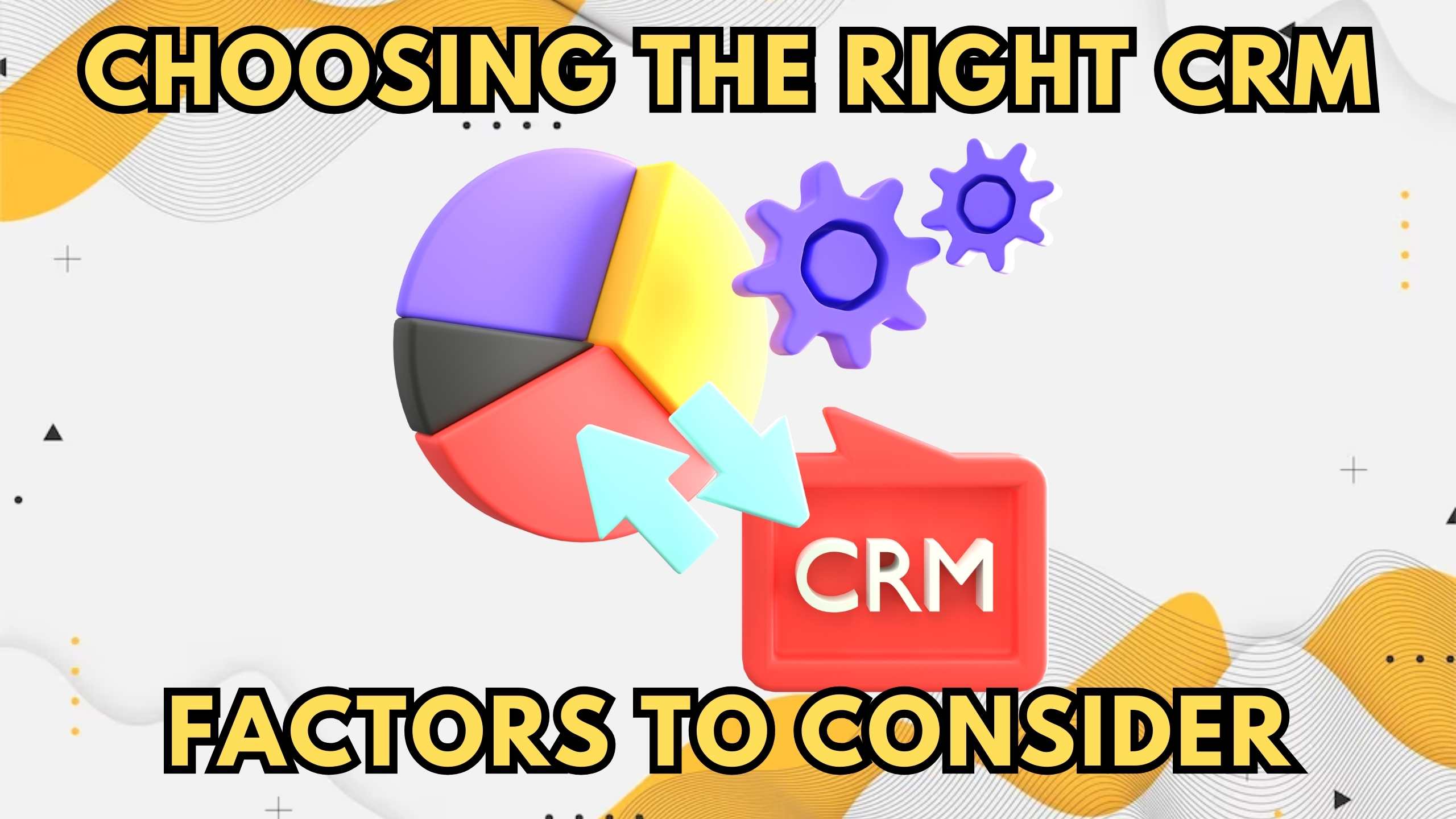Choosing the Right CRM: Factors to Consider
- Proposal Software Customer Relationship Management


Choosing the Right CRM: Factors to Consider
Selecting the right customer relationship management (CRM) system is a crucial decision for any business. The CRM you choose should meet the unique needs of your company and employees across departments. When evaluating CRMs, there are several key factors to weigh.
Alignment with Business Goals and Priorities
The first step is defining your organization’s goals and top priorities for adopting a CRM. Consider elements like targeting new customer acquisition versus improving relationships with existing customers. Or perhaps your main aims are enhancing sales team collaboration and pipeline visibility. Whatever the objectives, ensure the CRM under consideration delivers the core functionality to achieve them.
Some popular CRMs like Salesforce and HubSpot offer extensive customization and scalability to match your goals now and in the future. Outlining must-have features and capabilities upfront makes selecting the right system easier.
Data and Analytics Needs
A robust analytics engine should provide actionable insights to guide smarter decision making. Determine what metrics are most important to track across sales, marketing, and service interactions. Common examples are lead conversion rates, deal sizes, campaign ROI, and customer satisfaction scores.
CRM systems like Zoho and SugarCRM include built-in reporting and dashboards to monitor key performance indicators. More advanced platforms like Salesforce offer Einstein Analytics and predictive features to uncover hidden trends. Prioritize the data analysis capabilities that would make the biggest impact.
User-Friendliness and Adoption
The most technically advanced CRM is ineffective if staff don’t actually use it. When comparing options, consider the end-user experience and interface design. Look for intuitive navigation, flexibility to customize views, and capability to access on mobile devices.
Platforms like Monday.com and HubSpot emphasize ease of use with drag-and-drop simplicity. Salesforce Lightning offers a more consumerized user experience that sales and marketing users expect. Investing in adoption best practices, user training, and change management will also boost utilization.
Scalability and Flexibility
As your company grows in the future, can the CRM easily scale with advanced functionality? Evaluate both depth of native features as well platform extensibility. Seek a CRM capable of handling higher transaction volumes without performance lagging while meeting regulatory compliance.
Microsoft Dynamics 365 natively connects with essential productivity tools like Excel and Outlook. Salesforce AppExchange offers thousands of downloads to extend capabilities. Most vendor marketplaces let you deploy integrated apps to meet emerging needs. Prioritizing a flexible framework ensures your CRM evolves as business requirements do.
Total Cost of Ownership
While comparing pricing models of SaaS CRM options, calculating the total cost long-term is crucial. Factor true ongoing costs like user licenses, data storage fees, customer support, and required 3rd party integrations. Confirm which advanced features are included versus only accessible via premium add-ons which add to the price tag.
Platforms like Zoho CRM offer an affordable entry price and helpful free edition to get started. Salesforce pricing scales according to usage but comes with abundant functionality. Don’t just evaluate the subscription fee but projected expenses over time as adoption spreads enterprise-wide. Select cost-effective CRM aligned with likely utilization by roles and departments.
Integration with Existing Tech Stack
Any CRM under consideration should easily and tightly integrate with your company’s existing technology footprint across back office software, analytics tools, and marketing/sales automation stack among others. API capabilities make connecting these enterprise systems simpler to share essential customer data and drive efficiencies.
CRM market leaders like Microsoft, Salesforce and Oracle offer deep proprietary integrations and vast partner channels. Direct API connectors, packaged integrations, and pre-built modules provide extensive connectivity. Factor your current solutions and ease of harmonizing new and legacy systems influenced by IT standards and staff capability managing connections.
The options below are commonly used by small businesses and freelancers due to strong customer relationship management capabilities and cloud delivery model.
- HubSpot CRM simplifies sales and marketing coordination within a user-friendly platform at a reasonable price point for SMBs
- Zoho CRM delivers social, mobile, analytics, and gamification features accessible to solopreneurs and fast-growing companies alike
- Salesforce CRM offers their market-leading CRM platform tailored for teams just starting out or with limited sales users to manage
- Insightly is a full featured CRM optimized specifically for small businesses seeking customer visibility and organization-wide collaboration
- Capsule CRM aims to drive sales force productivity and pipeline growth for startups and lean teams via their straightforward CRM
In Summary
Selecting a customer relationship management platform involves multiple considerations around business objectives, end-user adoption, scalability, and ease of integration. Outlining essential use cases, feature sets, and budget considerations first allows you to match options to your organization’s requirements. Comparing leading CRM systems with extensive trial options aids evaluation based on hands-on experience. Investing time upfront to choose the right technology partner ensures your CRM actively works for your company rather than creating adoption headaches. Reaching alignment across decision makers and stakeholders also helps smooth implementation. With an optimal CRM powering enhanced workflows, your sales, marketing and service teams gain indispensible visibility into customer interactions and priorities for driving revenue growth.
Take Control of Your SaaS Stack
Managing multiple software subscriptions is time consuming and complex for lean teams without full time IT staff. As shown above evaluating customer relationship management (CRM) needs requires weighing many factors from start to finish. Now imagine applying that research and selection process across your full tech stack whenever adding or switching tools.
The platform Subscribed.fyi solves this subscription management headache for solopreneurs, agencies and small businesses. Sign up in seconds for Subscribed.fyi to take control of your tech stack. Our intuitive platform makes it easy to select the best SaaS products for your needs and budget. Then efficiently manage portfolio subscriptions going forward as you scale.
Relevant Links:
- HubSpot CRM
- Zoho CRM
- Salesforce CRM
- Salesforce Lightning
- Insightly
- Capsule CRM
- SugarCRM
- Microsoft Dynamics 365
- Salesforce AppExchange
- Subscribed.fyi








